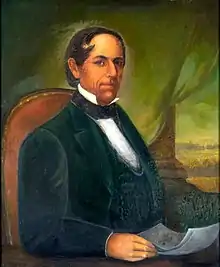Rancho San Pedro
Rancho San Pedro was one of the first California land grants and the first to win a patent from the United States.[1] The Spanish Crown granted the 75,000 acres (300 km2) of land to soldier Juan José Domínguez in 1784, with his descendants validating their legal claim with the Mexican government at 48,000 acres (190 km2) in 1828, and later maintaining their legal claim through a United States patent validating 43,119 acres (174.50 km2) in 1858. The original Spanish land grant included what today consists of the Pacific coast cities of Los Angeles harbor, San Pedro, the Palos Verdes peninsula, Torrance, Redondo Beach, Hermosa Beach, and Manhattan Beach, and east to the Los Angeles River, including the cities of Lomita, Gardena, Harbor City, Wilmington, Carson, Compton, and western portions of Long Beach and Paramount.[2][3]

History
Juan José Domínguez (1736–1809), a Spanish soldier, arrived in San Diego, California, in 1769 with Fernando Rivera y Moncada and served with the Gaspar de Portolà expedition and, along with Junípero Serra, traveled to San Juan Capistrano, San Gabriel, and Monterey. In 1784, Dominguez was granted a concession of seventeen Spanish leagues, or 75,000 acres (300 km2), from the Spanish Empire.[4]
Domínguez's original grazing permission stretched from present-day Compton to the Palos Verdes Peninsula but did not become a title to land until it was "re-granted" in 1822 in the Mexican era to Juan José's nephew and heir, Cristóbal Domínguez. Cristóbal died soon afterward, but his three sons settled on the ranch, building adobe homes. The following year Manuel Domínguez, eldest son of Cristóbal Domínguez, married María Engracia de Cota and commenced a successful career raising cattle and serving in a variety of elected and appointed offices in Los Angeles.
.jpg.webp)
For many years, a portion of the Rancho San Pedro land grant was contested between the Domínguez and Sepúlveda families through various appeals to Spanish Governors and lawsuits from 1817–1883 and was eventually partitioned into seventeen parcels in 1882. The Sepúlveda family was awarded 31,629 acres (128 km2) known as Rancho de los Palos Verdes that later became the cities of the Palos Verdes Peninsula, as well as portions of Torrance and San Pedro.[5]
With the cession of California to the United States following the Mexican–American War, the 1848 Treaty of Guadalupe Hidalgo provided that the land grants would be honored. As required by the Land Act of 1851, a claim for Rancho San Pedro was filed with the Public Land Commission in 1852,[6] and a patent for 43,119 acres (170 km2) was granted to Manuel Domínguez and signed by President James Buchanan on December 18, 1858.[7][8]
In 1869, Union Army Major General William Starke Rosecrans bought 16,000 acres (65 km2). The "Rosecrans Rancho" was bordered by what later was Florence Avenue on the north, Redondo Beach Boulevard on the south, Central Avenue on the east, and Arlington Avenue on the west.
Historic sites
- Dominguez Rancho Adobe. The adobe of Manuel Dominguez, completed in 1826, is a national historic site.[9][10]
- Battle of Dominguez Rancho. The Mexican–American war battle was fought on the rancho site.
- The Claretians have been based, and gardened, adjacent to the Dominguez Rancho Adobe since circa 1900.
See also
- List of Ranchos of California
- Ranchos of Los Angeles County, California
References
- Ogden Hoffman, 1862, Reports of Land Cases Determined in the United States District Court for the Northern District of California, Numa Hubert, San Francisco
- Map of old Spanish and Mexican ranchos in Los Angeles County
- U.S. Geological Survey Geographic Names Information System: Rancho San Pedro
- Robert Cameron Gillingham, 1961, The Rancho San Pedro, Cole Holinquist
- The Rancho San Pedro Collection Archived 2010-06-18 at the Wayback Machine
- United States. District Court (California : Southern District) Land Case 273 SD
- Report of the Surveyor General 1844 - 1886 Archived 2009-05-04 at the Wayback Machine
- Spencer, Terry (November 15, 1987). "Compton's Historic Tree Has Fallen Far From Glory Days". Los Angeles Times. Retrieved 29 February 2016.
- Dominguez Rancho Adobe Museum
- The Historic Dominguez Rancho Adobe Archived 2012-06-26 at the Wayback Machine